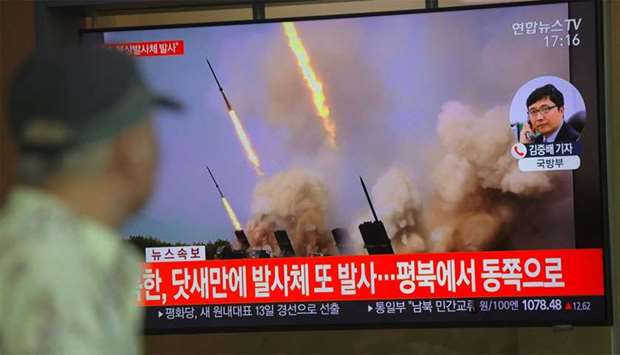* Launches come days after North Korea fired missile, rockets
* South calls launches worrisome and unhelpful
* US envoy in Seoul over stalled denuclearisation talks
North Korea fired what appeared to be two short-range missiles on Thursday in a likely protest by leader Kim Jong Un at the United States after he and President Donald Trump failed to reach agreement on nuclear weapons and missiles at a February summit, South Korea said.
US Secretary of State Mike Pompeo, who earlier cut short a European trip to return to Washington for meetings on Iran, would also have discussions on North Korea after learning of the launches, a senior US State Department official said.
The launches came less than a week after Kim oversaw the test-firing of multiple rockets and a missile and coincided with a visit to the South Korean capital by US special envoy for North Korea, Stephen Biegun.
The two missiles fired on Thursday went in an easterly direction from the northwestern area of Kusong, South Korea's Joint Chiefs of Staff said.
They covered distances of 420 km (260 miles) and 270 km (168 miles) and reached an altitude of about 50 km (30 miles) before falling into the sea, they said.
Pentagon spokesman Lieutenant Colonel Dave Eastburn said: ‘We're aware of the reports and monitoring.’
‘North Korea seemed to be discontented it could not reach a deal in Hanoi,’ South Korea's President Moon Jae-in told South Korean broadcaster KBS, referring to a summit in Hanoi in February with Trump.
North Korea has effectively pulled back from engagement with Washington since the summit, which fell apart without any agreement on dismantling Pyongyang's nuclear programme.
South Korea's Moon said that even if the missiles fired on Thursday were short range, they could still violate UN resolutions barring North Korea from developing its ballistic missile force.
Even so, Moon said he saw the tests as a sign that North Korea wanted to negotiate, and said he planned to push for a fourth inter-Korean summit with Kim.
Pompeo was due to meet Japan's Chief Cabinet Secretary Yoshihide Suga on Thursday afternoon in Washington.
WEEKEND TESTS
Analysts said it was too soon to say exactly what kind of missiles were involved in the latest launches, but the range would probably exceed that of most of the rockets North Korea fired on Saturday from its east coast into the ocean,
‘You don't know what missile it is just from how far it flew,’ said Yang Uk, a senior research fellow at the Korea Defence and Security Forum.
‘North Korea has returned to its classic escalation tactics from before,’ Yang added. ‘I believe they will keep escalating by using what appear to be short-range missiles, something that will not cause the US to react right away.’
Harry Kazianis, of Washington's Center for the National Interest think tank, said the new launches could only worsen already growing tensions.
‘While this recent launch of short-range missiles does not violate Pyongyang’s promise to halt longer-range tests, North Korea has now made it clear it will not halt developing other parts of its military capabilities that threaten the region,’ he said.
‘Kim’s goal, beyond ensuring his weapons programs are becoming more powerful, is quite clear: to show America and its allies that if they aren’t willing to compromise on the terms of denuclearization.’
On Saturday, North Korea also launched multiple rockets and at least one short-range ballistic missile.
That launch was the North's first test of a ballistic missile since launching an intercontinental ballistic missile in November 2017 and sharply raising tension at a time of stalemate in its talks with the United States.
This week, North Korea lashed out at the United States and South Korea, saying the launches at the weekend were ‘regular and self-defensive’ and rejecting the notion that they were provocative.
Trump and his administration nevertheless played down the weekend tests, and in a Twitter message on Saturday, the US president said he was still confident he could reach a deal with Kim.
In 2017, the North Korean leader declared the country's nuclear force was complete and extended an olive branch to the South and the United States, holding two summits with Trump and three with the South Korean president.
But the second summit with Trump broke down, with the United States insisting the North give up its nuclear programme, which it pursued for years in defiance of UN Security Council resolutions, and the North seeking sanctions relief.
South Korea's military said it had stepped up monitoring and security in case of another launch, and was working with the United States to get additional information on the missiles involved.
Japan's defence ministry said it had not detected any ballistic missile in its territorial waters or exclusive economic zone and saw no direct impact on security. North Korea has test-fired rockets over Japanese territory in the past.

